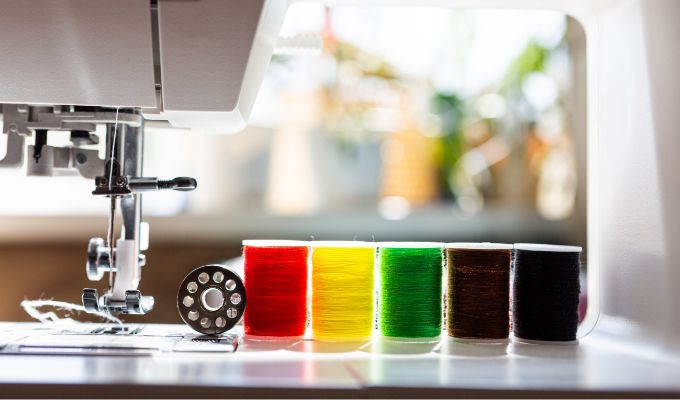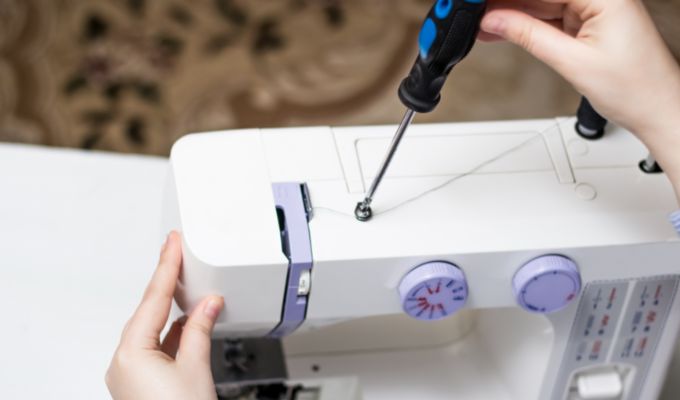Sewing threads are widely available in stores and online. Different threads are employed for various sewing tasks because of their unique compositions, strengths, colours, and other characteristics.
Good sewing starts with choosing the correct needle size and the proper thread. In the end, using low-quality thread is never a good idea because it can split and knot, and won’t hold seams together for long.
High-quality thread makes stitching a breeze. If you’ve ever used a sewing machine and had the thread tear repeatedly or if you’ve ever tried to stitch by hand and quickly ended up with a knotted thread that couldn’t be untangled, you’ll know what I’m talking about.
Excellent threads won’t curl and will be smooth, robust, long-lasting, uniformly thin, resistant to fading, and washable.
Consider not just the colour but also the thickness of the thread when shopping for a spool.
Always use threads of equal quality (ideally the same) and tension when stitching.
There are many different uses for thread besides the traditional needle and thread method. Sewing thread can be used for more than just mending clothes; it can also be used for decorative and embroidery projects.
The ideal thread for any sewing project
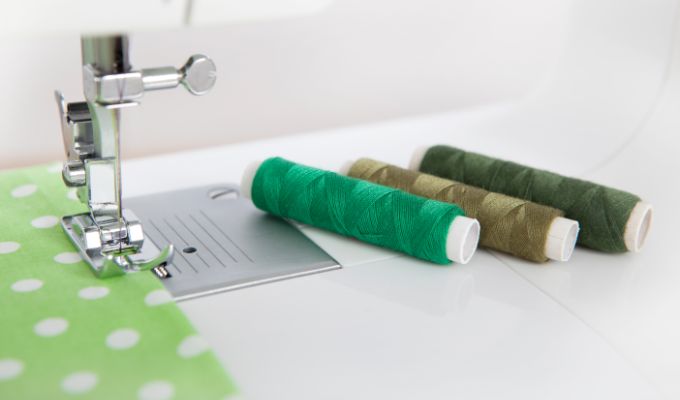
A variety of high-quality, multicoloured sewing threads should always be on hand. Popular brands of high-quality sewing thread include those made by Ackermann and Gütermann. You can get threads in every shade of the rainbow from these two companies’ massive pallets, which are familiar to everyone who has shopped for sewing thread at a specialised store.
However, both firms now offer convenient boxes of sewing thread in the most standard colours for domestic use. The main benefit of these kinds of sewing thread boxes is that the thread within is constantly well-organized, making it easy to locate a specific shade when needed.
Which Thread is Best?
There is a wide variety of threads to choose from when you need to sew. Almost any sewing project may be completed with success with a decent quality general-purpose thread like that made by Ackermann or Gütermann. Polyester fabric is durable, stretches well, doesn’t tear, shrink, or rot, and is available in a rainbow of hues.
Sewing thread need not be made from the same material as the fabric being used. Making sure the thickness of your fabric is reflected in the amount of your sewing thread is crucial! When sewing, use a thinner thread for lightweight textiles like cotton and a thicker thread for denim and heavier fabrics like wool to achieve the desired results.
The fact is that there isn’t a single type of sewing thread that works well with every stitch or material. Stitching by hand and sewing in a sewing machine are both distinct processes. To generate the desired sewing techniques or decorative effects, yarn thickness must always be matched to the thickness of the sewing material.
Thinner sewing thread with less resistance to tearing is indicated by a larger number in the thread size. Therefore, a 30-gauge thread is thicker and more resistant to tears than an 80-gauge thread.
Polyester thread
As was stated before, polyester sewing thread is the universal thread of the sewing industry. Sew-all threads are a common name for polyester sewing threads. Use it on your sewing machine or by hand; the thread works well for both. Superior grip and abrasion resistance are two of the many benefits of polyester thread for stitching.
As a result, it’s a common tool for any kind of stitching.
Cotton thread
Whether you like to sew by hand or with a machine, cotton sewing thread is the way to go because it is made of 100% cotton and works well with both cotton and linen. The cotton yarn has the distinct benefit of being easy to colour.
When it comes to using natural threads, cotton sewing threads are your go-to. Their exceptional durability and lusterless sheen make an impression. Cotton’s inherent fibres allow for a nice and even seam that is also quite comfortable to the touch.
Ne 50 by Gütermann is an old-school cotton thread that has stood the test of time. It’s machine and hand-sewable because of its mercerized cotton construction, and it’s ideal for finishing touches like topstitching and seam closures.
Silk Thread
A 100% pure silk thread, silk sewing thread can be used in either a sewing machine or by hand. Silk sewing thread, with its luxurious lustre, stands out among its counterparts.
That’s why you’ll see it so frequently in haute couture, as well as in high-end tailoring, with fabrics like silk, satin, wool, and cashmere.
Thread for an Overlock Machine
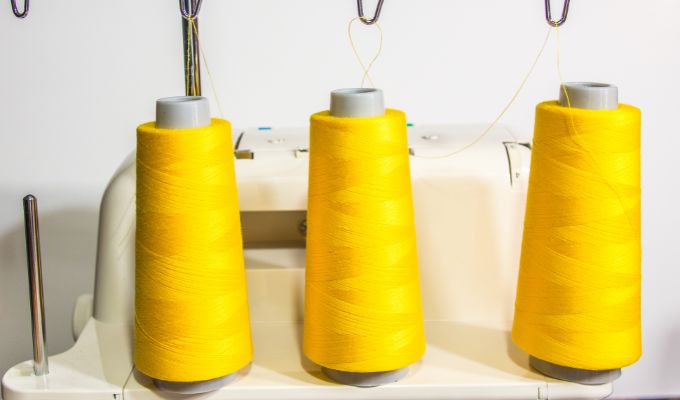
Since overlock seams require a unique type of thread, overlock thread was created for the purpose. Overlocks consume more thread than sewing machines, hence overlock threads are sold in bulk (1000 – 5000 yards cones).
When using an overlocker machine, you should always have four spools of the same colour of thread on hand.
Button threads

Specialized polyester thread of the 30 weight needed to make buttonholes is known as “buttonhole thread.” It was designed for use in making decorative stitches, decorative seams, topstitching, and buttonholes in heavy fabrics.
It has a slight sheen and is available in many different colours
Embroidery Threads
Fabrics can be given unique colour or sheen treatments with the help of embroidery threads. When embroidering a logo or pattern, machine embroidery thread is commonly utilised. It’s usually polyester, although other materials can be used as well.
Most machine embroidery threads have a beautiful shine that draws attention to the design you stitch and the thread itself. They’re so durable that even high-velocity stitching won’t break them.
Metallic Thread
Decorative stitching can be given additional glitz with the help of metallic threads. Due to being slightly thicker than typical thread, they are sometimes prone to breaking. To prevent the thread from breaking, a metallic needle designed for the purpose is the best option.
Thread for a bobbin
Bobbinfil thread, made of polyester, is slightly thinner than standard thread, allowing more to be wound into a single bobbin. As a result, you’ll get more use out of each bobbin and spend less time changing them. Also, its small weight makes it ideal for machine embroidery, as there will be less thread buildup in intricate patterns. It can also be used for basting, as it leaves behind only a thin, lightweight thread.
Threads from Sewing Jeans (Denim)
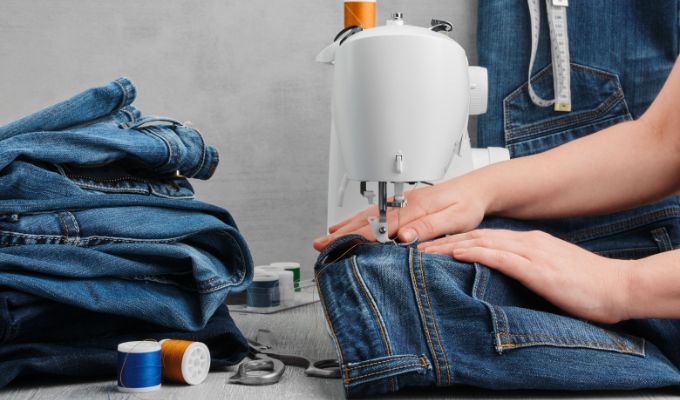
Denim is a heavyweight fabric, thus it calls for a heavier thread. Stronger than conventional threads, jean threads can either blend in with the denim or stand out as the top stitching.
With their subtle sheen, jeans threads are perfect for quilting, bag making, and any other craft that calls for a lovely thread. I put them to use in making a triangle-shaped travel bag.
How much does sewing thread cost?
Quality sewing threads are more durable and simpler to work with, so it’s important to pay attention to that while you’re shopping. If you’re having trouble with poorly finished seams or frequent thread breaks while sewing, check to see if the thread is good and if that low-quality thread wasn’t utilised. Quality sewing thread will cost you more money.
The average price for one spool of thread from a reputable brand is about £5. Most inexpensive stores sell low-quality yarns in a range of colours because they can make a bigger profit off of the eyeballs.
Different types of sewing thread sets come in a wide variety of attractive containers. The fact that all of your sewing thread can be found in a neat little box is a huge plus.
